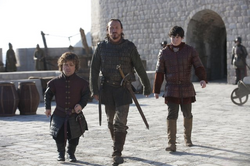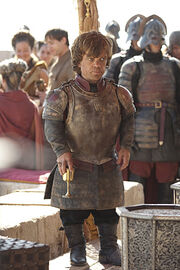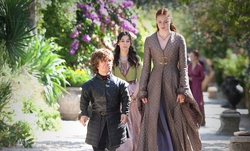
Tyrion Lannister, shorter than others due to his dwarfism.
- Tyrion Lannister: "Look at me and tell me what you see. "
- Jon Snow: "Is this a trick?"
- Tyrion Lannister: "What you see is a dwarf. If I had been born a peasant, they might have left me out in the woods to die. Alas, I was born a Lannister of Casterly Rock. Things are expected of me."
- — Tyrion Lannister explains a dwarf's lot in life.[src]
Dwarfism is a congenital medical condition that humans can be born with, considered a deformity, which results in those afflicted with it possessing shorter than average height. A person born with this condition is known as a dwarf, and a plural number of such persons are known as dwarfs. The condition of dwarfism is known to have occurred in human populations both in Westeros and in Essos.
As a medical condition
- "All dwarfs are bastards in their fathers' eyes."
- ―Tyrion to Jon Snow
Dwarfs are not a distinct race or species, not anymore than those born mentally handicapped are. Non-human races such as the Children of the Forest or the Giants are believed to have gone extinct many thousands of years ago, and some believe they never existed at all. Some non-human races such as the Giants, as it turns out, actually do exist in isolated regions of the world such as beyond the Wall. Still, for the most part, the Known World is populated entirely by humans, though humans are split into many different races, ethnicities, and nationalities. Unlike the fables told to children by nurses such as Old Nan, there is no distinct "race" of dwarfs in the realistic world Westeros is in - simply a few human beings with the medical condition of dwarfism.
Dwarfism can be inherited, though sometimes the children of dwarfs will not inherit their parent's condition and possess average height. Sometimes dwarfism is inherited by lays dormant in a bloodline for many generations, only for a dwarf child to be born into a family that almost forgot that it had a distant dwarf ancestor.
Other times, dwarfism can occur completely at random, with absolutely no prior family history.
Physical effects

Many dwarves have disproportionately short limbs
- "To teach me humility, the gods have condemned me to watch you waddle about wearing that proud lion that was my father's sigil and his father's before him!"
- ―Tywin Lannister derides his son Tyrion for being born a dwarf.
The degree to which different individuals are affected by dwarfism varies from individual to individual. Some may possess fairly proportionate limbs for their size, while others can be quite misshapen and suffer from medical problems as a result. One of the more common forms of dwarfism is for individuals to be not only shorter than average, but to possess proportionately smaller limbs relative to the torso, which results in a waddling gait when they walk.
Dwarfism does not affect intelligence, thus Dwarfs are in general no more or less intelligent that any other average person. In some ways this can be more of a burden, because while the simpleminded (i.e. mentally retarded people, such as Hodor) might not be fully aware of how differently they are treated by society, dwarfs are fully aware of the level of discrimination they face from society due to their deformity.
Discrimination and social status

Sansa Stark towers over Tyrion, whom she was not thrilled about marrying due in-part to his appearance.
- "They say I'm half a man - but what does that make the lot of you?"
- ―Tyrion rallys his troops at the Battle of the Blackwater
Dwarfs face a considerable amount of discrimination in the pre-modern, not politically correct medieval world of Westeros and Essos. Even though they possess normal intelligence levels, they are often treated as no better than lackwit fools. Most have to take demeaning, humiliating jobs as court fools and jesters just to make enough money to eat. Indeed, when a dwarf infant is born into a family of common smallfolk, they often simply leave it out in the woods for the wolves. They leave it to die because in a primarily agrarian society based on demanding physical labor, a dwarf cannot physically contribute enough labor to justify the net loss in feeding and providing for them. The smallfolk often live hand-to-mouth and simply cannot afford to take care of them. Dwarf born into noble Houses, however, are rarely abandoned to die, because their family can afford the expense of raising them. The nobility represents only a very small fraction of society, however, and dwarf are rare to begin with, so there are very few noble-born dwarfs in Westeros at any one given time.
Worse, as a medieval society, people in the Seven Kingdoms and beyond have a very simplistic view of the world which strongly believes that outward appearances reflect inner moral qualities. People who look beautiful are assumed to therefore be good, and people who are outwardly ugly are assumed to be bad. In the children's stories Old Nan used to tell, or the popular romance ballads about Jonquil and so forth, the romantic knight fighting for love and honor is always very hansome to reflect his inner goodness, while only evil characters appear to be ugly.
As a result, dwarfs are typically assumed to be morally degenerate, aggressive, and to commit evil acts without provocation - simply because they look unattractive compared to the rest of society. In a way this often becomes a self-fulfilling prophecy (not that anyone will ever admit to it), because logically many dwarfs become deeply embittered after a lifetime of mistreatment from everyone they encounter. For example, Tywin Lannister irrationally mistreated his dwarf son Tyrion Lannister his entire life, but in return, Tywin was honestly confused why Tyrion did not show him utter loyalty in return. Instead, Tywin deluded himself into thinking that Tyrion hated his father simply because he was an evil and ungrateful dwarf - refusing to accept his own responsibility for tormenting his son over his condition as a dwarf.
Similarly, a major point in the story is that Joffrey has absolutely no redeeming qualities other than that he is rather handsome. He is not simply cruel, but an utter imbecile, and dangerously incompetent when dealing with his powerbase in House Lannister. Even from a standpoint of ruthless practicality, Joffrey is an insane idiot who does more harm to House Lannister than good. Even so, people in the narrative who haven't met Joffrey, or only seen him in public events at King's Landing, have difficulty accepting that he is is a cruel lunatic. This goes against the simplistic worldview that has been impressed on them by their own popular culture of romance songs and poetry. Sansa Stark, in particular, became obsessed with Joffrey after encountering him simply because he was very handsome, even though she knew absolutely nothing about his personality. For that matter, Sansa assumed that Joffrey's mother Queen Cersei would have a regal and dignified personality to match her appearance, even though in private she is more like a petty and vindictive child in an adult's body.

Joffrey, closer to the physical ideal than his dwarf uncle Tyrion, was assumed by many to therefore be morally ideal.
Even into the first months of Joffrey's reign as king, many commoners assume that the "good King Joffrey" will soon restore peace and order and put an end to the war. At first, some can't really grasp that Joffrey himself started the war with a flippant outburst to kill Eddard Stark, and thus assume Eddard may have deserved it (given that no "sane" ruler would randomly execute a major lord without justification). Only gradually and grudgingly do people start to suspect that Joffrey might not be a fit king, but even then, they try to rationalize this disconnect between Joffrey's beautiful appearance and horrible personality by latching onto the belief that assuredly, Joffrey's uncle, the "demon-monkey" dwarf Tyrion must be leading the attractive boy astray with bad counsel. Only after Joffrey has several meltdowns in open court, and brazenly commits several atrocities in full view of the public (i.e. needlessly starting the Riot of King's Landing by antagonizing starving refugees) do people start to accept that someone as attractive as Joffrey could truly be so evil.
Above and beyond this, being born a dwarf is often seen as a punishment from the gods, both the Old and the New. Many different religions believe that individuals are born as dwarfs due to a negative judgement from the gods, even if there is no evidence that they are their family did anything wrong. Some believe that dwarfs are simply a cruel jape, the gods having a joke at humanity's expense. Either way, the result is that simply for being born as a dwarf, an act they had no control over, dwarfs are often seen as bringing shame onto their families simply for existing.
Known dwarfs in Game of Thrones
How to pluralize "dwarfs"
The proper plural of "dwarf" is "dwarfs". The plural "dwarves" was popularized by medieval linguist and fantasy author J.R.R. Tolkien in his Middle-earth mythos, including The Hobbit(1937) and The Lord of the Rings (1954-1955). When Tolkien first published The Hobbit in 1937, the common plural was actually "dwarfs" - as seen in Disney's full-length animated film Snow White and the Seven Dwarfs, released that same year. There have been recorded instances of the less-popular variant "dwarves" since the early nineteenth century, but it was never very common. As a master-linguist, for several obscure etymological reasons Tolkien concluded that the "real historical" plural of "dwarfs" should be "dwarrows", which when modernized was closer to "dwarves". That, and Tolkien also admitted that he just personally preferred "dwarves" as a distinct plural - considering that the proper plural of "Elf" is "Elves", not "Elfs", it made more sense to him that "dwarf" should also have its own distinct pluralization. Whatever the cause, due to the popularity of Tolkien's works, the use of the plural "dwarves" become very common in fantasy settings.
Even so, in the present day the plural "dwarves" refers specifically to fictional Fantasy races, either Tolkien's or the myriad Fantasy works inspired by his writings. It is considered offensive to refer to real-life people afflicted with dwarfism as "dwarves" - the correct plural is "dwarfs".
